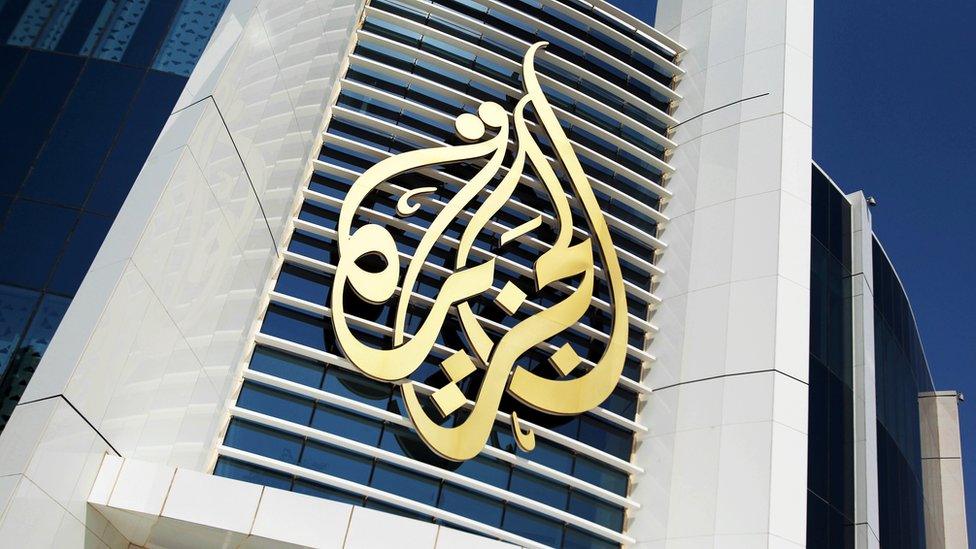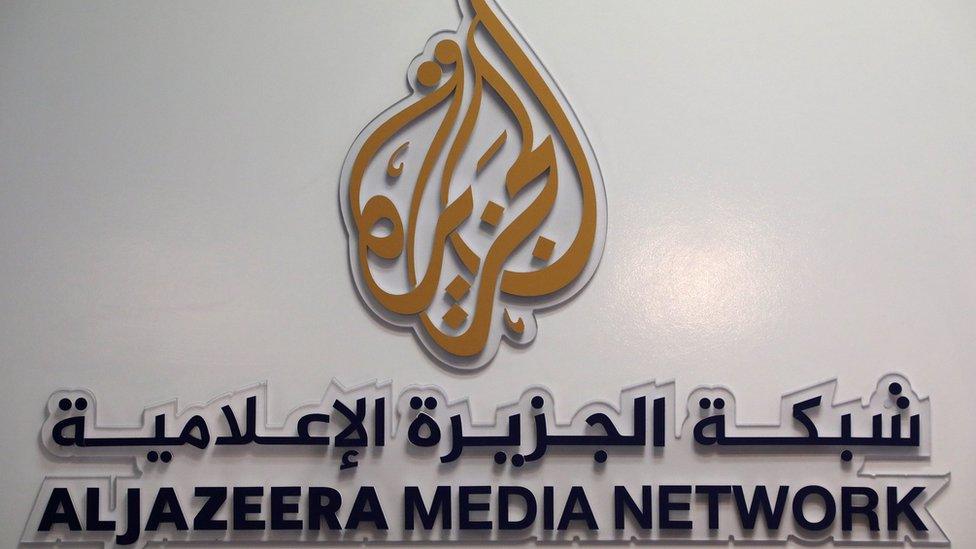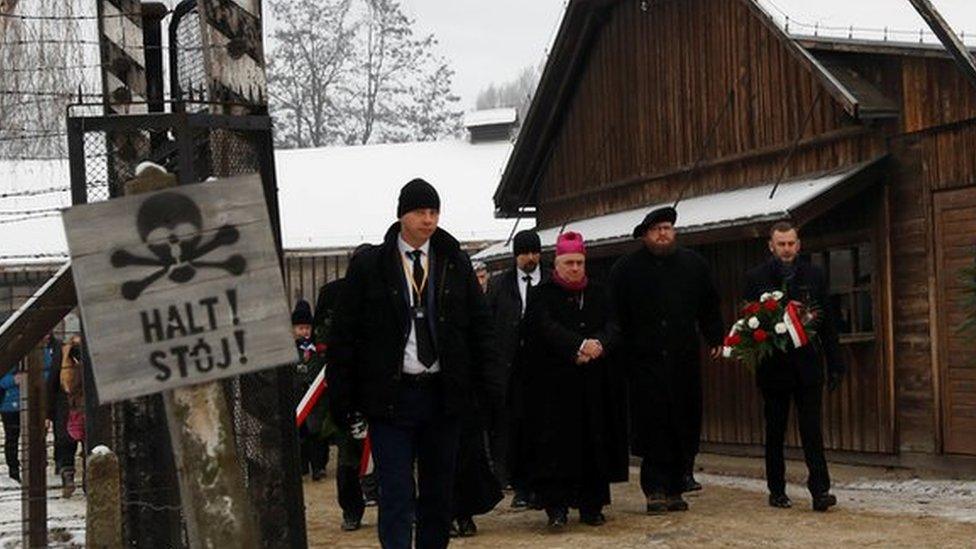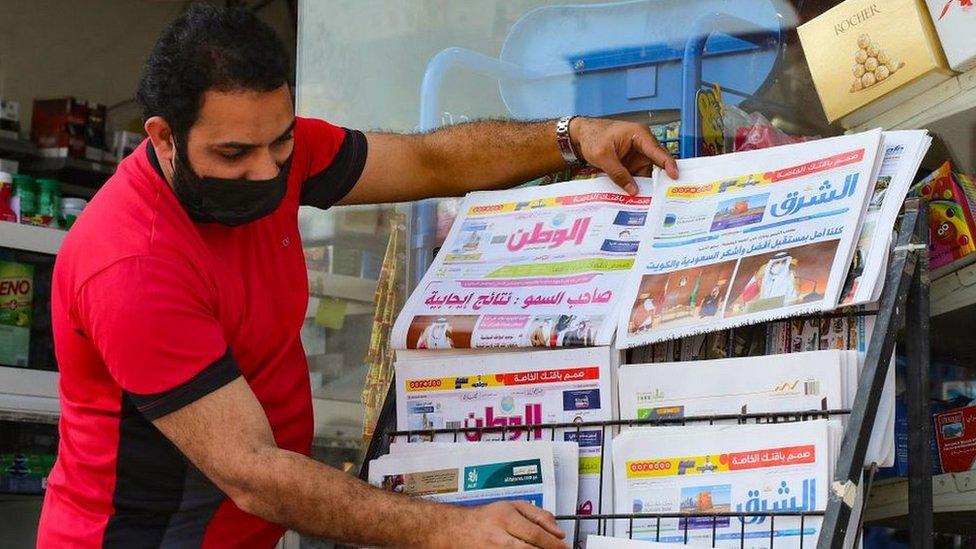Al Jazeera suspends journalists for Holocaust denial video
- Published

The video was published by Al Jazeera's online video network AJ+
Al Jazeera has suspended two journalists over a video they produced that denied the facts of the Holocaust.
The Qatari state-funded broadcaster had published the video on its online AJ+ video service in Arabic.
During World War Two, six million Jewish people were systematically killed by the Nazis.
Al Jazeera's video said this number had been exaggerated and "adopted by the Zionist movement", and that Israel is the "biggest winner" from the genocide.
Its narrator also asked, "why is there a focus only on them?" - referring to the Jewish victims - before claiming that the community uses "financial resources [and] media institutions" to "put a special spotlight" on Jewish suffering.
How did people react to the video?
The video was published on the AJ+ Twitter and Facebook pages on Friday evening local time, with a caption asking: "What is the truth of the Holocaust and how did the Zionist movement benefit from it?"
It was posted in Arabic, but drew strong criticism after the US-based non-profit Middle East Media Research Institute (Memri) tweeted an English translation.
Questioning the number of Jewish victims killed, suggesting that Jewish people manipulate the media, and claiming that Jewish people or the State of Israel benefit from the Holocaust have been condemned as forms of anti-Semitism.
Emmanuel Nahshon, spokesman for Israel's Ministry of Foreign Affairs, said the video was "the worst kind of pernicious evil".
"That's how Al Jazeera brainwashes young people in the Arab world and perpetuates hatred of Israel and the Jews," he said. "Lies and evil propagated by the ideological descendants of 'Der Stürmer'."
Der Stürmer was an anti-Semitic Nazi propaganda publication.
Medhi Hasan, one of the broadcaster's most prominent journalists, said he was "glad to see Al Jazeera bosses taking disciplinary action" over the "ridiculously offensive and dumb video".
And some people noted the difference between the content published on Al Jazeera's Arabic pages, and its English language journalism.
Allow X content?
This article contains content provided by X. We ask for your permission before anything is loaded, as they may be using cookies and other technologies. You may want to read X’s cookie policy, external and privacy policy, external before accepting. To view this content choose ‘accept and continue’.

What has Al Jazeera said?
In a statement released on Sunday evening, Al Jazeera said it had "swiftly deleted" the video, stating that it had "violated the editorial standards of the network".
"Al Jazeera stated today, that it has taken disciplinary action and suspended two of its journalists over video content produced on the Holocaust," it said.
The statement added that Al Jazeera "continues to adhere to the journalistic values of honesty, courage, fairness, balance, independence, credibility and diversity, giving no priority to commercial or political over professional consideration.
"In addition, the Network recognizes the diversity in societies with all races, cultures, beliefs and their values and intrinsic individualities."
Dr Yaser Bishr, executive director of the broadcaster's digital division, also said that he had called for "mandatory bias training and awareness programme".
AJ+ channels' managing director Dima Khatib added that the video "was produced without the due oversight".

Al Jazeera Arabic vs Al Jazeera English: A stark contrast
Analysis by Amira Fathalla, BBC Monitoring
Al Jazeera English is known to audiences worldwide for its varied coverage, which often sheds light on underreported stories.
But its reporting - which only occasionally hints at the affiliations of its Qatari owners - comes in stark contrast to Al Jazeera Arabic.
AJA's obvious stance on key regional crises and rivalries heavily colours its output.
Its friendly coverage of Islamist groups - particularly favouring those aligned with the Muslim Brotherhood - came to the fore particularly with the 2011 uprisings in the region.
Some of its correspondents have adopted a still harder line. In 2015, prominent anchor Ahmed Mansour offered a sympathetic account of the activities of al-Qaeda's Syria affiliate in a lengthy interview with its leader.
Since a major rift between Gulf states erupted in 2017, AJA's coverage has also shifted closer to Iran.

- Published8 June 2017

- Published27 January 2019

- Published20 February 2023
